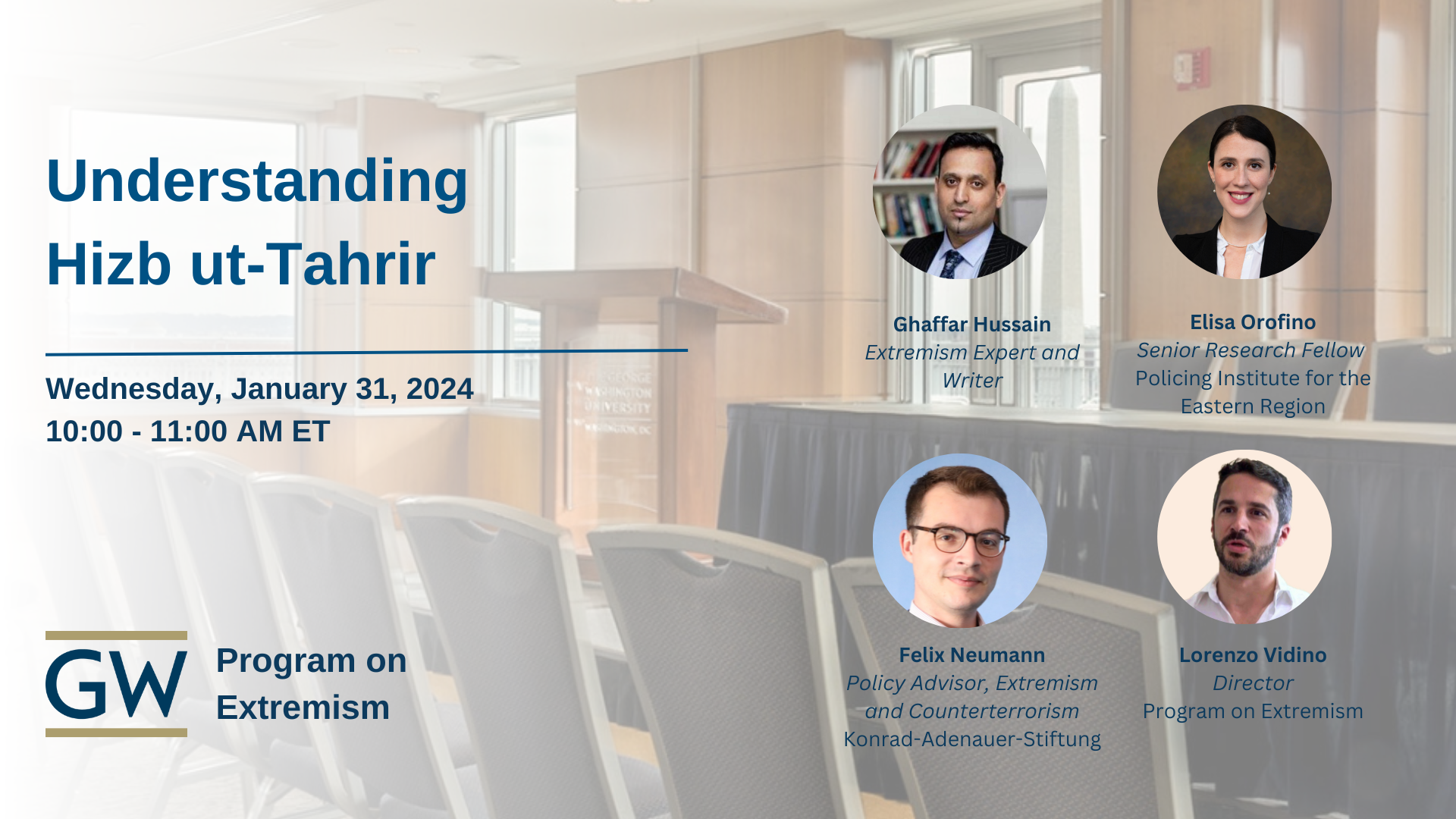Understanding Hizb ut-Tahrir

On January 18, the British government formally banned Hizb ut-Tahrir, an international Islamist group the UK Home Secretary described as “an antisemitic organization that actively promotes and encourages terrorism, including praising and celebrating the appalling 7 October attacks.” Banned in several Muslim-majority countries, Hizb ut-Tahrir operates freely in the West, despite previous attempts by some Western governments to outlaw it.
To discuss the ideology, activities and reach of Hizb ut-Tahrir and the potential implications of banning it, on January 31, at 10 AM EST, the Program on Extremism at The George Washington University hosted a virtual event with three experts with extensive knowledge on the group.
This event was moderated by Program Director Lorenzo Vidino and it featured insights from:
- Ghaffar Hussain, Extremism Expert and Writer
- Elisa Orofino, Senior Research Fellow at the Policing Institute for the Eastern Region (PIER) at Anglia Ruskin University
- Felix Neumann, Policy Advisor, Extremism and Counterterrorism at Konrad-Adenauer-Stiftung
Ghaffar Hussain opened the discussion by discussing the historical background of Hizb ut-Tahrir (HT) in the aftermath of the U.K. government’s banning of the group on January 18th. Ghaffar detailed the group’s ideological features, strategies, and attitude towards violence. Hussain covered the organization’s roots in the 1950s as a Pan-Arab and Pan-Islamist group whose primary aim was–and still is—the creation of an Islamic caliphate. Hussain explained HT pursues this goal through a three-phased approach in which it 1) recruits prominent individuals to its cause, 2) these prominent individuals spread their beliefs to the broader Muslim public, and 3) the cause has such overwhelming support that governments turn over power and allow the creation of an Islamic caliphate(s).
Hussain stated that while HT ideology does not call for its members to commit acts of violence or terror, its rhetoric is violent and anti-Semitic, as it justifies and encourages violence and terrorism from other Islamist groups, particularly in areas it considers occupied by outside forces, e.g., Palestine and Kashmir. Hussain ultimately posited that HT is not a terrorist organization, but it is a violent one because it endorses other Islamist groups’ use of terrorism.
The next speaker was Elisa Orofino, who primarily discussed the strategy and tactics of Hizb ut-Tahrir while contextualizing the U.K. government’s ban on the organization. Orofino opened with a three-point overview of HT’s approach, centering around brinkmanship/conflict with authorities, the establishment of a caliphate, and rejection of violence.
Orofino also emphasized HT’s focus on recruitment and retention, describing how their self-efficacy and positive intergroup differentiation maintain the long-term membership of the individuals involved with the organization. Finally, Orofino argued that the ban in the U.K. marked a turning point from describing HT as “extreme” to describing it as “terrorist.”
The final speaker was Felix Neumann, who discussed the history and approach of the German government towards Hizb ut-Tahrir. Neumann first described the origins of HT’s presence in Germany from its inception to 2003, detailing the rise of HT activity in universities alongside other Islamic organizations. Following this, Neumann spoke about the 2003 ban in Germany, which aimed to limit the scope of extremist entities by placing a ban on associations and a ban on activity.
Neumann continued by discussing the ban's consequences, which were the dissolution and decentralization of HT in response to the changing political environment in Germany. Neumann concluded his segment by discussing the usage of social media to spread extremist content. In particular, he referenced how new Islamic organizations form and are based on social media platforms, using such platforms to spread information and influence the discourse on relevant topics, such as the issue of Israel and Palestine.

